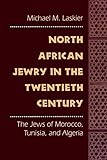North African Jewry in the Twentieth Century : The Jews of Morocco, Tunisia, and Algeria / Michael M. Laskier.
Material type: TextPublisher: New York, NY : New York University Press, [2020]Copyright date: ©1997Description: 1 online resourceContent type:
TextPublisher: New York, NY : New York University Press, [2020]Copyright date: ©1997Description: 1 online resourceContent type: - 9780814750728
- 9780814765364
- 961.004924
- DS135.A25L
- online - DeGruyter
| Item type | Current library | Call number | URL | Status | Notes | Barcode | |
|---|---|---|---|---|---|---|---|
 eBook
eBook
|
Biblioteca "Angelicum" Pont. Univ. S.Tommaso d'Aquino Nuvola online | online - DeGruyter (Browse shelf(Opens below)) | Online access | Not for loan (Accesso limitato) | Accesso per gli utenti autorizzati / Access for authorized users | (dgr)9780814765364 |
Browsing Biblioteca "Angelicum" Pont. Univ. S.Tommaso d'Aquino shelves, Shelving location: Nuvola online Close shelf browser (Hides shelf browser)

|

|

|

|

|

|

|
||
| online - DeGruyter She's Mad Real : Popular Culture and West Indian Girls in Brooklyn / | online - DeGruyter Sex Fiends, Perverts, and Pedophiles : Understanding Sex Crime Policy in America / | online - DeGruyter Celluloid Sermons : The Emergence of the Christian Film Industry, 1930-1986 / | online - DeGruyter North African Jewry in the Twentieth Century : The Jews of Morocco, Tunisia, and Algeria / | online - DeGruyter Stopping the Killing : How Civil Wars End / | online - DeGruyter Women of Steel : Female Bodybuilders and the Struggle for Self-Definition / | online - DeGruyter Unbecoming Blackness : The Diaspora Cultures of Afro-Cuban America / |
restricted access online access with authorization star
http://purl.org/coar/access_right/c_16ec
Before widescale emigration in the early 1960s, North Africa's Jewish communities were among the largest in the world. Without Jewish emigrants from North Africa, Israel's dynamic growth would simply not have occured. North African Jews, also called Maghribi, strengthed the new Israeli state through their settlements, often becoming the victims of Arab-Israeli conflicts and terrorist attacks. Their contribution and struggles are, in many ways, akin to the challenges emigrants from the former Soviet Union are currently encountering in Israel. Today, these North African Jewish communities are a vital force in Israeli society and politics as well as in France and Quebec. In the first major political history of North African Jewry, Michael Laskier paints a compelling picture of three Third World Jewish communities, tracing their exposure to modernization and their relations with the Muslims and the European settlers. Perhaps the most extraordinary feature of this volume is its astonishing array of primary sources. Laskier draws on a wide range of archives in Israel, Europe, and the United States and on personal interviews with former community leaders, Maghribi Zionists, and Jewish outsiders who lived and worked among North Africa's Jews to recreate the experiences and development of these communities.Among the subjects covered:--Jewish conditions before and during colonial penetration by the French and Spanish;--anti-Semitism in North Africa, as promoted both by European settlers and Maghribi nationalists;--the precarious position of Jews amidst the struggle between colonized Muslims and European colonialists;--the impact of pogroms in the 1930s and 1940s and the Vichy/Nazi menace;--internal Jewish communal struggles due to the conflict between the proponents of integration, and of emigration to other lands, and, later, the communal self-liquidiation process;-the role of clandestine organizations, such as the Mossad, in organizing for self-defense and illegal immigration;-and, more generally, the history of the North African `aliyaand Zionist activity from the beginning of the twentieth century onward.A unique and unprecedented study, Michael Laskier's work will stand as the definitive account of North African Jewry for some time.
Mode of access: Internet via World Wide Web.
In English.
Description based on online resource; title from PDF title page (publisher's Web site, viewed 01. Nov 2023)


